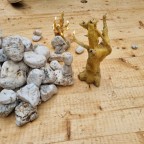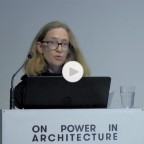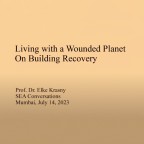Gathering Feminist Resisters: Assemblies, Dinners, Salons, and Tribunals
Lecture at at Feminist Histories, Radical Women,
MASP Museu de Arte de Sao Paulo, November 12, 2018
Gathering Feminist Resisters: Assemblies, Dinners, Salons, and Tribunals
Curatorial labour can be understood as a work of gathering that brings together non-humans and humans. While curatorial history writing, including critical feminist histories of curating, has by far privileged the exhibition format, this lecture focuses on social, cultural, and activist gatherings. Through a transhistorical this presentation will include the following key examples: Jewish salon culture during the late 18thand early 19thcentury; lesbian salon culture and transracial salons hosted by Negritude women at the early 20thcentury; cultural, social and political activism during the United Nations Decade for Women 1975–1985, highlighting the International Tribunal on Crimes Against Womenand Suzanne Lacy’s International Dinner Party; art activism at the beginning of the 21stcentury, in particular Black Women Artists for Black Lives Matter, initiated by Simone Leigh, and Guess Who’s Coming for Dinner, Too? by Patricia Kaersenhout. The analysis combines art historical materialism and political thought to tease out how curating gatherings practices feminist resistance
2,000 participants at International Tribunal on
Crimes Against Women. 1974
––––––––––––––––––––––––––––––––––––––––––
FREE INSCRIPTIONS ON THE DAY OF THE EVENT
–––––––––––––––––––––––––––––––––––––––––-
NOVEMBER 12th, 2018
MON | 10h – 18h
10h
Introduction with Adriano Pedrosa and Jochen Volz.
10h30 – 12h30
ANDREA GIUNTA | Radical Women, an Intersectional Perspective
In this presentation I will analyze Radical Women, an exhibition about art made by Latin American and Latinx artists from 1960-1985. Although it starts from what the art world was, and in large part still is – patriarchal, racist, and classist –, this exhibition subverts the patriarchal perspective, here replaced by a feminine and feminist perspective. An authorship of predominantly white female artists persists. However, the agenda of the exhibition goes beyond these appearances. Matters of race and sexual dissidence are addressed in different works, considering perspectives that can be understood from a critical position towards the parameters of the regimented societies of Latin America, whose normative ideal was white and heterosexual. Societies in which some women had recently achieved the right to vote and, like other areas of society, were subject to repression, censorship, imprisonment, and torture.
EUGENIA VARGAS PEREIRA | Accounts Towards a Feminist Conversation
In this presentation, I will approach my experience as a woman and artist in the world of photographers during the 1980s, approaching my works present in the exhibition Radical Women. What did it mean to be a feminist in that decade? How did the art world react to it? I will speak about how the inclusion of the body in my work brought along marks of previous memories and experiences accumulated over time.
JANET TORO | Limits, Creativity, and Resistance
I will show performances and installations made between 1990 and 2017 in Chile and Germany. The works presented are a response to the extreme realities I experienced, in which limits – whether of social, political, or economical terms – delimited a restraining territory. My production is a response to such contexts. Creativity gathered with imagination goes beyond, bringing knowledge together and questioning the borders of contingency with minimal gestures, radical works. They are signs of resistance, and their edges also offer a glimpse of poetry.
14h – 16h
ELKE KRASNY | Gathering Feminist Resisters: Assemblies, Dinners, Salons, and Tribunals
Curatorial labor can be understood as a work of gathering that brings together non-humans and humans. While curatorial history writing, including critical feminist histories of curating, has by far privileged the exhibition format, this lecture focuses on social, cultural, and activist gatherings. Through a transhistorical perspective, this presentation will include the following key examples: the Jewish salon culture during the late 18th and early 19th century; the lesbian and transracial salons hosted by Negritude women at the early 20th century; the cultural, social and political activism during the United Nations Decade for Women 1975-1985, highlighting the International Tribunal on Crimes Against Women and Suzanne Lacy’s International Dinner Party; art activism at the beginning of the 21st century, in particular the collective Black Women Artists for Black Lives Matter, initiated by Simone Leigh, and Guess Who’s Coming for Dinner, Too?, by Patricia Kaersenhout. The analysis combines art historical materialism and political thought to tease out how curating gatherings practice feminist resistance.
RENATA BITTENCOURT | Black Radicalness
This presentation intends to broaden the reflections provided by the exhibition Radical Women: Latin American Art, 1960-1985, focusing on the production of African-American female artists. Names like Adrian Piper, Senga Nengudi, Lorraine O’Grady, and Howardena Pindell are representative of Black women who approached issues related with gender and ethnicity in their works.
KATY DEEPWELL | On the Presence and Politics of Local/Global Dynamics in Feminism and Contemporary Art
Where is feminist activity manifest in contemporary art? How can it exist as so intensely local and at the same time be global in its reach? Is feminism only visible in one form in the arenas of cosmopolitan and international exchanges (the blockbuster exhibition, the art biennale or the art journal)? Is it seen only through certain topics, issues or ideas? Where do the national or regional models of study in art history and criticism touch the reality and multiplicity of women artists’ productions, networks and transnational exchanges? Can feminism only be identified in notions of transmission and engagement through histories or genealogies, or trajectories or does it remain unrecorded and elusive, “out there”? Or is feminism always “recovered,” “constructed” after the fact? Is feminism limited if it is only “uncovered” in key works by individual artists or can its presence across multiple forms and sites be understood only when many group activities, events, exhibitions, publications are recognised?
16h30 – 18h
JUDY CHICAGO | Looking back at The Dinner Party
In October 2017, an exhibition titled Roots of The Dinner Party: History in the Making opened in the galleries of the Elizabeth A. Sackler Center for Feminist Art at the Brooklyn Museum, where The Dinner Party has been permanently housed since 2007. In conjunction with this exhibit, the National Museum of Women in the Arts in Washington D.C. opened a smaller show, Inside The Dinner Party Studio, which explored my unique collaborative methods. The presentation will survey these two shows and look back at my journey from my early research into what was then an unknown history of women in Western civilization, to the fulfillment of my goal of permanent housing. I will also discuss the ongoing impact of The Dinner Party, which was seen by one million viewers during its worldwide tour from 1979 to 1988 and has attracted 1.5 million viewers since it has been at the Brooklyn Museum.
MAURA REILLY | Curatorial Activism: Resisting Sexism and Masculinism
“Curatorial Activism” is a term I use to designate the practice of organizing art exhibitions with the principle aim of ensuring that certain constituencies of artists are no longer ghettoized or excluded from the master narratives of art. It is a practice that commits itself to counter-hegemonic initiatives that give voice to those who have been historically silenced or omitted altogether—and, as such, focuses almost exclusively on work produced by women, artists of color, non-Euro-Americans, and/or queer artists. In this presentation, I will focus on the importance and mini-historiography of curatorial activist projects that resist sexism and masculinism, and will explore current statistics that substantiate the urgent need for a reevaluation of curatorial practice.
This second event presents itself as a forum where artists, curators, and theorists can approach the main topics related with feminism and art, thus engendering new perspectives in connection with the exhibition Radical Women: Latin American Art, 1960-1985, parallelly taking place at Pinacoteca de São Paulo and based on a theme that concerns MASP’s curatorial project for 2019.
It is also part of the research undertaken for the exhibition Histories of Women, Feminist Histories, expected to come about in MASP between August and November 2019. The exhibition is split in two parts: Histories of Women, which includes artworks from several territories, styles, and pictorial genres, ranging from the 16th century until the late 19th, and Feminist Histories, comprising artists of different nationalities who work around feminist ideas or in response to them in the 21st century.
The seminar integrates the public program of the exhibition Radical Women: Latin American Art, 1960-1985, curated by Cecilia Fajardo-Hill and Andrea Giunta, and organized by the Hammer Museum of Los Angeles, currently on display at Pinacoteca de São Paulo until November 19th.
Organization: Adriano Pedrosa, André Mesquita, Isabella Rjeille, and Jochen Volz.



